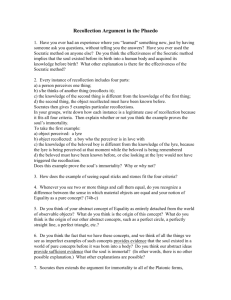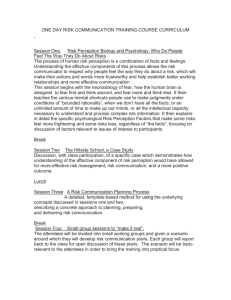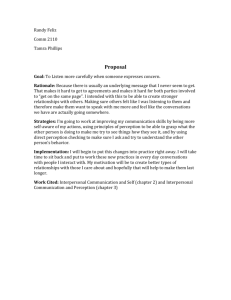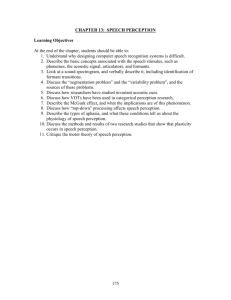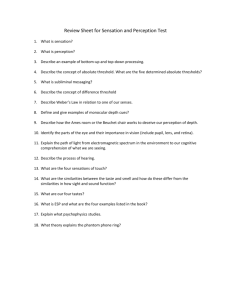Document 13592164
advertisement
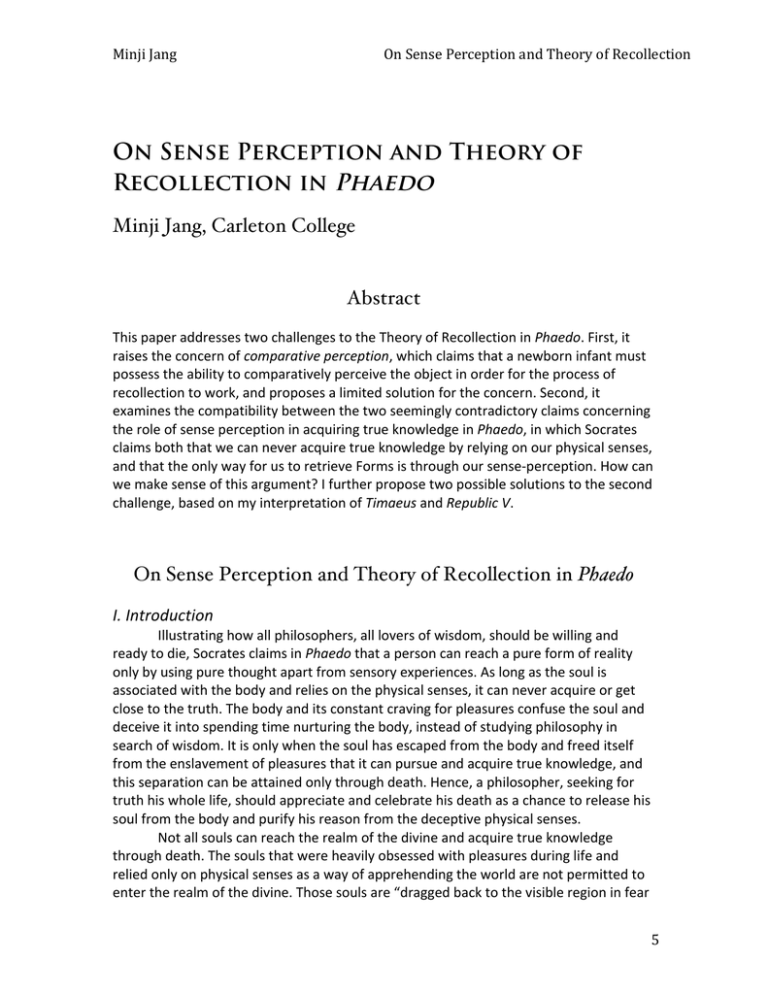
Minji Jang On Sense Perception and Theory of Recollection On Sense Perception and Theory of Recollection in Phaedo Minji Jang, Carleton College Abstract This paper addresses two challenges to the Theory of Recollection in Phaedo. First, it raises the concern of comparative perception, which claims that a newborn infant must possess the ability to comparatively perceive the object in order for the process of recollection to work, and proposes a limited solution for the concern. Second, it examines the compatibility between the two seemingly contradictory claims concerning the role of sense perception in acquiring true knowledge in Phaedo, in which Socrates claims both that we can never acquire true knowledge by relying on our physical senses, and that the only way for us to retrieve Forms is through our sense-­‐perception. How can we make sense of this argument? I further propose two possible solutions to the second challenge, based on my interpretation of Timaeus and Republic V. On Sense Perception and Theory of Recollection in Phaedo I. Introduction Illustrating how all philosophers, all lovers of wisdom, should be willing and ready to die, Socrates claims in Phaedo that a person can reach a pure form of reality only by using pure thought apart from sensory experiences. As long as the soul is associated with the body and relies on the physical senses, it can never acquire or get close to the truth. The body and its constant craving for pleasures confuse the soul and deceive it into spending time nurturing the body, instead of studying philosophy in search of wisdom. It is only when the soul has escaped from the body and freed itself from the enslavement of pleasures that it can pursue and acquire true knowledge, and this separation can be attained only through death. Hence, a philosopher, seeking for truth his whole life, should appreciate and celebrate his death as a chance to release his soul from the body and purify his reason from the deceptive physical senses. Not all souls can reach the realm of the divine and acquire true knowledge through death. The souls that were heavily obsessed with pleasures during life and relied only on physical senses as a way of apprehending the world are not permitted to enter the realm of the divine. Those souls are “dragged back to the visible region in fear 5 Minji Jang On Sense Perception and Theory of Recollection of the unseen and of Hades” and wander around the earthly world. Only the souls that diligently practiced philosophy and sought for a true form of reality can be purified through death and enter a region of the noble and invisible. The art of philosophy hence “persuades the soul to withdraw from the senses insofar as it is not compelled to use them” and to “trust only itself and whatever reality, existing by itself, the soul by itself understands, and not to consider as true whatever it examines by other means.”i On the other hand, in his Theory of Recollection, Socrates emphasizes that sense perception is the only way to retrieve Forms: “this conception [of Forms] of ours derives from seeing or touching or some other sense perception, and cannot come into our mind in any other way.”ii It is through physical senses that we perceive the particulars and realize that they strive to be, yet are deficient in, being like Forms. Now, there is some confusion about the role of sense perception in helping us acquire true knowledge and prepare our souls for death. Should we “refrain as much as possible from association with the body” to purify our souls until their destined release from physical parts?iii Or should we utilize perception through physical senses to recollect Forms? In this paper, I examine the compatibility of these two claims. I first look into the Theory of Recollection in Phaedo to establish the idea of Forms and the process of recollection. Then, I draw attention to two main challenges to the theory: the problem of Comparative Perception and the role of physical senses in attaining true knowledge. Finally, I suggest possible solutions, mainly for the second challenge, and evaluate their effectiveness. II. Theory of Recollection and Knowledge of Forms In Phaedo, Socrates introduces the Theory of Recollection as his second argument for the immortality of the soul. Upon the acceptance of the theory, he argues that the soul has necessarily existed before birth, and hence that it has a life span separate from that of the body. Socrates defines the recollection in his theory as follows: Do we not also agree that when knowledge comes to mind in this way, it is recollection? What way do I mean? Like this: when a man sees or hears or in some other way perceives one thing and not only knows that thing but also thinks of another thing of which the knowledge is not the same but different, are we not right to say that he recollects the second thing that comes into his mind?iv In this definition, recollection is a process in which the subject S perceives and knows a thing X, and thinks of another thing Y, which is different from X. In this context, X represents things that we can perceive through physical senses, such as seeing, smelling, hearing, tasting and touching, while Y represents things we cannot sense or perceive. In Socratic theory, those things represented by X are named sensible particulars and things represented by Y, Forms. In Phaedo, Forms are described as “the reality of all other things that which each of them essentially is,” including the Equal itself, the Just, the Beautiful. The process of recollection contains three specific conditions. First, Y is different from X and the knowledge of Y is different from the knowledge of X. Second, S must 6 Minji Jang On Sense Perception and Theory of Recollection have known Y prior to his perception of X. Third, the perception of X makes S think of Y. There is another crucial condition, which is not directly entailed by the definition: S has forgotten Y prior to his perception of X.v We can apply this condition to the second one: Second, S has known yet has forgotten Y prior to his perception of X. Given that S has lost Y prior to his perception of X and recollects Y after the perception of X, we can reasonably infer that recollecting Y necessarily involves perceiving of X. It is definitely from X that we recollect Y and Y “cannot come into our mind in any other way.”vi From this, we can rewrite the third condition: Third, Y is recollected only through the perception of X. These conditions can then be summarized as follows: S recollects Forms if, and only if, the following conditions are satisfied: 1. Forms are different from sensible particulars and the knowledge of Forms is different from the knowledge of sensible particulars. 2. S has known and forgotten Forms prior to his perception of sensible particulars. 3. Forms are recollected only through the perception of sensible particulars. Socrates further explains the difference between sensible particulars and Forms through his example of the equals and the Equal itself. The equals, such as equal stones and sticks, appear equal to one perceiver and unequal to another, or appear equal in some situations and unequal in others. The Equal itself, however, never appears unequal; it appears equal to all intellectors in all circumstances. From this, we can infer that the equal things are not the same as the Equal itself. 1. The equals sometimes, while remaining the same, appear unequal. 2. The Equal itself never appears unequal. 3. The equals and the Equal itself are not the same. Another crucial difference is that we can perceive particulars through bodily senses, while we can never perceive Forms in the same way. Instead, we should approach them “with thought alone, without associating any sight with his thought, or dragging in any sense perception with his reasoning.”vii Sensible particulars can be apprehended by our body, while Forms are unperceivable through physical senses and can only be apprehended by pure thought of the soul. There are two types of recollection in the Theory of Recollection: recollection by things that are similar and recollection by things that are dissimilar.viii Socrates primarily focuses on the recollection by things that are similar and claims that we must “consider whether the similarity [of those things] to that which one recollects [Forms] is deficient in any respect or complete.”ix Socrates argues that, in this type of recollection, sensible particulars not only resemble Forms but also are deficient in their resemblance to Forms. For instance, when we see two sticks that are equal, we simultaneously see that they are “not equal in the same sense as what is Equal itself” and that there is “some deficiency in their being such as the Equal.”x In order to recollect the Equal itself, we must know the equals and realize their deficiency in being like the Equal itself that we 7 Minji Jang On Sense Perception and Theory of Recollection once had known. This becomes another essential step of recollection: upon perceiving equal sticks, one realizes that they strive to be like the Equal but fall short of it. From this, Socrates infers that we must have known the Equal itself prior to our initial perception of the equal objects. Since we start perceiving these objects as soon as we are born, we must have acquired the knowledge of the Equal itself either before or at the moment of birth. Socrates further claims that if we have the knowledge, then we must be able to give an account of our knowledge.xi Since we, as newborn infants, are incapable of giving an account of such knowledge, we do not possess the knowledge at the moment of our birth. Because we do not possess the knowledge at the moment, and because it is impossible to lose and acquire the knowledge at the same time,xii we cannot acquire the knowledge at the moment of birth, which means that we must have acquired the knowledge prior to birth. For birth is the moment the body comes to life, the body could not have existed before birth, and it is necessarily the soul that has existed and acquired the knowledge. Again, the Theory of Recollection directs that we acquire the knowledge before birth, lose it at birth, and recollect it after birth through our perception of sense particulars.xiii It is from this process of recollection that Socrates concludes that the soul has existed prior to any physical incarnation, hence proving the first step of its immortality. III. First Challenge: Comparative Perception Socrates wins easy approval from Simmias and Cebes,xiv yet it is reasonable to raise questions about some of the steps in the process of recollection. For instance, a crucial step in the argument predicts that upon perceiving the equal objects, we realize that they strive to be like the Equal itself but fall short of it. One might ask why our perception necessarily involves that particular step. Why can’t we just perceive two equal sticks as equal without comparing their degree of resemblance to the Equal itself, thereby recollecting it? Michael Morgan addresses a similar concern.xv Socrates says that our experience of sensible objects somehow leads to recollection, yet what kind of experience does he refer to? Morgan claims that the perception that triggers the process of recollection is not a normal one, but a separate and specific kind that he calls Comparative Perception (CP). According to Morgan, CP includes both a “perception of an object as being F” and a “reflective awareness that the object wants to be like the F but falls short, is deficient, or is inferior with respect to it,” with F representing Forms.xvi CP, in this regard, necessarily involves the process of recollection in which we compare the resemblance of sensible objects to Forms and recognize their deficiency in being like Forms. These conditions can be summarized as follows: 1. CP necessarily involves the process of recollection. 2. The process of recollection requires the prior knowledge of Forms. 3. (By 1 and 2) CP requires the prior knowledge of Forms. 8 Minji Jang On Sense Perception and Theory of Recollection If we assume that CP occurs from the moment of our birth, we must have acquired the necessary knowledge of Forms either before or at the moment of birth. Since we already established that we are incapable of giving an account of our knowledge, hence incapable of possessing the knowledge at birth, we must have acquired the knowledge before birth. These steps can be summarized as follows: 4. CP occurs as soon as we are born. 5. (By 3 and 4) The soul must have acquired the knowledge of Forms before birth. 6. (By 5) The soul must have existed before birth. 7. (By 1-­‐6) The soul must have existed before any particular birth. In this context, however, we must first accept the fourth premise that CP occurs as soon as we are born in order to reach the desired conclusion of the Theory of Recollection, that being the preexistence of the soul. The burden for Socrates then is to prove the fourth premise. It is not enough for him to claim that “we began to see and hear and otherwise perceive right after birth,” because CP, being the specific kind of sense experience, involves more than a mere sense perception.xvii Socrates is also asked to prove that we begin to activate the reflective awareness of comparing the sensible objects to Forms and recognizing their deficiency as soon as we are born. Nowhere in Phaedo can we find proof for the claim that a newborn infant not only perceives objects but also accompanies his perception with the reflective awareness that comprises CP from the moment of birth. This is potentially a major obstacle to the Theory of Recollection. If Socrates cannot assure that an infant uses CP as soon as he is born, he can no longer argue that the soul must have had the knowledge of Forms prior to birth. Even after the scenario in which an infant learns it at the time of birth is excluded, it is still possible that the infant acquires the necessary knowledge sometime after his birth yet before his initial CP. The possibility of this scenario impairs the following conclusion that the soul must have existed before birth, which is Socrates’ purpose for introducing the Theory of Recollection. One possible way to derive the fourth premise that ‘CP occurs as soon as we are born’ from Socrates’ claim in Phaedo that ‘we begin to perceive as soon as we are born’ is to add another premise to the argument: all sense perceptions necessarily involve CP. With the addition of this premise, the argument for recollection can be written as follows: 4. All sense perceptions necessarily involve CP. 5. Sense perception occurs as soon as we are born. 6. (By 4 and 5) CP occurs as soon as we are born. 7. (By 3 and 6) The soul must have acquired the knowledge of Forms before birth. 8. (By 7) The soul must have existed before birth. 9. (By 1-­‐8) The soul must have existed before any particular birth. 9 Minji Jang On Sense Perception and Theory of Recollection This argument works, yet now we need the proof for the replaced fourth premise. Why must all sense perception necessarily involve CP? Why can’t there be some elementary levels of perceptions that include only a mere perception of sensible objects and nothing else? Morgan suggests the passivity of the soul as a possible solution. If our souls are passive so that CP is occurring “as a result of automatic response,” instead of a conscious attempt of comparison, Socrates may be able to argue that even a newborn infant can use CP from the moment of birth as a natural process that accompanies a mere perception.xviii However, the burden is not to prove that “CP can occur as soon as we are born” but to prove that “CP must occur as soon as we are born,” so that all of us must have acquired the knowledge of Forms prior to birth through the preexistence of our souls. Without proving this, this solution is limited. Yet, there is another crucial challenge to the Theory of Recollection: the role of sense perception in acquiring and retrieving the knowledge of Forms. IV. Second Challenge: The Role of Sense Perception This challenge draws upon the third condition of the Theory of Recollection that we established earlier: Forms are recollected only through the perception of sensible particulars. Socrates claims that Forms, the knowledge of which one had possessed before birth and lost at birth, can be recollected only through perceiving the sensible objects that partake in those Forms. “Then surely we also agree that this conception of ours derives from seeing or touching or some other sense perception, and cannot come into our mind in any other way, for all these senses, I say, are the same.”xix Why is it a problem that sense perception plays such an indispensable role in grasping and recollecting Forms? It is because we established in our earlier discussion that we can never grasp or apprehend the knowledge of Forms through bodily senses. According to Socrates, the body is “an obstacle when one associates with it in the search of knowledge,” because the physical senses are not always accurate and incapable of capturing the unchanging realities of the world.xx One can never acquire true knowledge through sense perception; only by reasoning through pure thought alone, detached from all physical senses, can one approach true realities. From this, Socrates claims that one should appreciate death as a chance to release the soul from the imprisonment of the body, and that one should practice philosophy during life in order to dissociate his soul as much as possible from his body and be ready to purify his soul at the moment of death. The important question then arises: should one or should one not use the body and sense perception in his approach to true knowledge? Socrates argues that philosophy persuades the soul to “withdraw from the senses insofar as it is not compelled to use them” to “trust only itself and whatever reality, existing by itself.”xxi The soul is further advised “not to consider as true whatever it examines by other means, for this is different in different circumstances and is sensible and visible, whereas what the soul itself sees is intelligible and invisible.”xxii How can we cope with this claim, while still accepting the premise that Forms are recollected only through the perception of sensible things? 10 Minji Jang On Sense Perception and Theory of Recollection V. Solutions One possible solution is to broadly interpret the idea and context in which the soul is compelled to use physical senses. In this regard, we should not blindly trust our perception as true reality but should still use it to identify the difference between what is perceived and the reality it resembles. For instance, when one sees two equal sticks, one should not consider the equalness he perceives in those objects as the Equal itself. Instead, one should recognize that those objects are striving to become the Equal itself yet are deficient in it. We can consider this kind of perception, CP, as the compelled or necessary use of physical senses, through which we recollect true knowledge that we once had possessed. If, however, we excessively rely on the physical senses and regard our perception as the only truth, we are no longer considered compelled to use them. By doing so, we may fail to dissociate our soul from the body and our reason from perception, which prevents us from learning or re-­‐learning true knowledge. This interpretation is coherent with Socrates’ view in Timaeus on the necessity of physical senses in the acquisition of knowledge: Let us rather declare that the cause and purpose of this supreme good is this: the gods invented sight and gave it to us so that we might observe the orbits of intelligence in the universe and apply them to the revolutions of our own understanding. For there is a kinship between them, even though our revolutions are disturbed, whereas the universal orbits are undisturbed. So once we have come to know them and to share in the ability to make correct calculations according to nature, we should stabilize the straying revolutions within ourselves by imitating the completely unstraying revolutions of the gods. Likewise, the same account goes for sound and hearing -­‐ these too are the gods’ gifts, given for the same purpose and intended to achieve the same result.xxiii In this text, Socrates explains that it is from the benefit of sight, along with other physical senses, that we started inquiring into the nature of the universe and that it is from such inquiry that we began to practice philosophy, “a gift from the gods to the mortal race whose value neither has been nor ever will be surpassed.”xxiv According to Socrates, we are given sight and other physical senses to inquire into the nature of the universe and enhance our understanding. In this regard, we are not only allowed but also encouraged to use sense perception as a necessary means to retrieve the knowledge of Forms, the true realities of the world. We may still wonder where to draw a line between the compelled and excessive use of physical senses, the former of which is encouraged and the latter, highly inappropriate. Socrates offers an insight in Republic V through his distinction of the “lovers of sights” and “true philosophers.”xxv A lover of sights, according to Socrates, is someone who “believes in beautiful things, but doesn’t believe in the beautiful itself and isn’t able to follow anyone who could lead him to the knowledge of it.”xxvi He fails to acknowledge the existence of true realities beyond the sensible things and trusts his perception as the ultimate reality. A philosopher, on the other hand, is someone who “believes in the beautiful itself, can see both it and the things that participate in it and doesn’t believe that the participants are it or that it itself is the participants.”xxvii He 11 Minji Jang On Sense Perception and Theory of Recollection recognizes the existence of true realities and the deficiency of sensible things in being like those realities; at the same time, he treats his perception as a means to get closer to the realities, instead of considering it as the reality itself.xxviii We should thus aim to become philosophers, instead of becoming the lovers of sights, failing to see what lies beyond our perception, and this gives us one possible way to reconcile the two claims. Another possible solution is to claim that recollecting is not necessarily the same as knowing. In this regard, the fact that we are capable of recollecting Forms does not necessarily mean that we are simultaneously capable of knowing them. This view is consistent with Socrates’ remark in Phaedo that everybody recollects Forms, yet not everybody has knowledge of them. A man who has knowledge would be able to give an account of what he knows, or would he not? He must certainly be able to do so, Socrates, he said. And do you think everybody can give an account of the things we were mentioning just now? I wish they could, said Simmias, but I’m afraid it is much more likely that by this time tomorrow there will be no one left who can do so adequately. So you do not think that everybody has knowledge of those things? No indeed. So they recollect what they once learned? They must.xxix His remark relies on the premise that one must be able to give an account of what he knows. Since presumably no one can give a precise account of Forms, especially at birth, yet since everyone seems to recollect Forms from the moment of birth when he or she starts perceiving the sensible objects that are resembling Forms, it is safe to conclude that knowing, in this context, is different from recollecting. This idea can be summarized as follows: 1. One who has the knowledge must be able to give an account of what he knows. 2. No one can give an account of Forms (at birth). 3. (By 1 and 2) No one has the knowledge of Forms (at birth). 4. Everyone recollects Forms (at birth). 5. (By 3 and 4) Knowing is not necessarily the same as recollecting. I added the phrase “at birth” to emphasize the impossibility of anyone giving an account, and hence knowing Forms at that time, yet both Simmias and Socrates seem to agree that not even a grown-­‐up man can give an accurate account of Forms, such as the Equal itself, the Good and the Beautiful. Constantly recollecting Forms throughout his life, he may have some mental grasp of them, but he cannot have the knowledge of Forms as long as he cannot give a precise account. If recollecting is not the same as knowing, then when can we ever know Forms? The answer to this question can be found in the different roles of body and soul described in Phaedo. Socrates emphasizes multiple times that the soul reasons best by 12 Minji Jang On Sense Perception and Theory of Recollection itself without associating with the bodily senses. In other words, the soul can only acquire the knowledge of Forms when it is completely dissociated from the body or when it departs from the body through death. It really has been shown to us that, if we are ever to have pure knowledge, we must escape from the body and observe things in themselves with the soul by itself. It seems likely that we shall, only then, when we are dead, attain that which we desire and of which we claim to be lovers, namely, wisdom, as our argument shows, not while we live; for if it is impossible to attain any pure knowledge with the body, then one of two things is true: either we can never attain knowledge or we can do so after death.xxx As Socrates explains, we can either never attain true knowledge or only do so after death. There are two ways to interpret this statement. One is to claim that we are altogether capable of attaining knowledge after death or not. The other is to claim that some of us are capable of attaining knowledge after death, while others are not. The second interpretation forms a more coherent argument with Socrates’ previous claim that only the trained souls can enter the realm of the divine. If we “refrain as much as possible from association with the body,” we can join “the company of people of the same kind” departing from the body.xxxi Only people of this kind acknowledge the limits of sense perception and the existence of true realities beyond sensible things, and hence constantly practice philosophy to dissociate their souls from the bodies. Only they can acquire true knowledge after death, hence being able to give a true account of Forms. Socrates did not fear, but rather appreciated the calling of his death, because he was confident that he belonged to this kind. Socrates knew that he would, just like other true lovers of wisdom, be “freed and released from the regions of the earth” and “make [his] way up to a pure dwelling place.”xxxii By differentiating knowing from recollecting, we may successfully reconcile the two claims about the role of sense perception in the acquisition of true knowledge. In this perspective, physical senses are the essential component of recollection during the present life, but not of the acquisition of true knowledge, allowed only after death. VI. Conclusion The Theory of Recollection is an essential step of Socrates’ argument on the immortality of the soul and the importance of practicing philosophy in preparation for the afterlife. In order to reach the realm of the divine after being released from the body, the soul must practice reasoning through pure thought and seek for true realities, instead of relying on perception through bodily senses. Sense perception is deceptive in that it alone cannot provide us with the true realities behind what is perceived. By acknowledging the limitations of physical senses, we can use them in the proper way and the proper situations in which we perceive the sensible things, and from such perception, recollect Forms. This paper has attempted to resolve the outward contradiction between the two main claims of Socrates about the role of sense perception and the acquisition of true 13 Minji Jang On Sense Perception and Theory of Recollection knowledge. Socrates claims that the soul should withdraw from physical senses and use only pure thought to attain true knowledge. At the same time, he claims that the soul can recollect true realities, the knowledge of which it had previously possessed, only through sense perception. One possible solution allows for the constrained use of physical senses in approaching true knowledge, through which one is permitted to use physical senses only when one acknowledges the existence of true realities beyond perceivable things and uses his perception merely as a means to get closer to the ultimate truth. Another solution differentiates the process of recollecting from that of knowing, thereby suggesting that one can use physical senses to recollect Forms in the present life, but can only know and give an account of Forms after death. By drawing a clear distinction between the roles of body and soul, and their relationship before, during, and after the present life, this paper introduced a possible compromise between the two opposing claims about the Theory of Recollection. 14 Minji Jang On Sense Perception and Theory of Recollection Works Cited "PHAEDO." In Readings in Ancient Greek Philosophy, edited by S. Marc Cohen, Patricia Curd, and C.D.C. Reeve, 267-­‐319. Indianapolis: Hackett Publishing Company, 2011. "TIMAEUS." In Readings in Ancient Greek Philosophy, edited by S. Marc Cohen, Patricia Curd, and C.D.C. Reeve, 652-­‐682. Indianapolis: Hackett Publishing Company, 2011. "REPUBLIC V." In Readings in Ancient Greek Philosophy, edited by S. Marc Cohen, Patricia Curd, and C.D.C. Reeve, 483-­‐514. Indianapolis: Hackett Publishing Company, 2011. Morgan, Michael L. "Sense-­‐Perception and Recollection in the "Phaedo"" Phronesis 29, no. 3 (1984): 237-­‐351 i Ibid., 83b. Ibid., 75a. iii Ibid., 67a. iv Ibid., 73d, my emphasis. v Ibid., 76e. vi Ibid., 74e. vii Ibid., 65e. viii Ibid., 74a. ix Ibid., 74a. x Ibid., 74d. xi Ibid., 76b. xii Ibid., 76d. xiii Ibid., 75e. xiv Ibid., 77b. xv Morgan, Michael L. "Sense-­‐Perception and Recollection in the "Phaedo"" Phronesis 29, no. 3 (1984): 237-­‐351. xvi Morgan (1984), p241. xvii Phaedo, 75b. xviii Morgan (1984), p248. xix Phaedo, 74d, my emphasis. xx Ibid., 65b. xxi Ibid., 83b. xxii Ibid., 83b. xxiii Timaeus, 47b-­‐c. xxiv Ibid., 47b. xxv Republic V, 475e. xxvi Ibid., 476c. xxvii Ibid., 476d. xxviii Socrates suggests that we call the thought of a lover of sights opinion and the thought of a philosopher, knowledge. xxix Phaedo, 76b-­‐c. ii 15 Minji Jang On Sense Perception and Theory of Recollection xxx Ibid., 66e, my emphasis. Ibid., 67b. xxxiixxxii Ibid., 114c. xxxi 16
